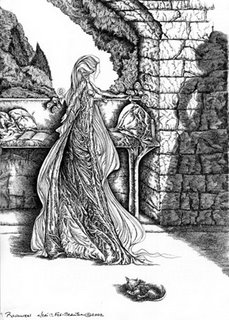Children's Literature, R.I.P.?

"Parents have always fretted about what to read to their children, and experts have always been ready with advice. In their educational writings, John Locke and Jean Jacques Rousseau together mentioned only three books worthy of a child's mind. Locke recommended Aesop's Fables and Reynard the Fox, while in Emile the tutor Jean Jacques offered his charge only Robinson Crusoe. How times have changed. The new 2,471-page, lap-crushing Norton Anthology of Children's Literature includes several hundred entries, both old and new. But far from representing an efflorescence in childhood literature, this volume marks the genre's sad end.
The editors of the anthology acknowledge in passing their debt to Locke and Rousseau—who in a sense created our modern understanding of childhood, permanently influencing all subsequent children's literature. The editors, however, wish to promote a revolution of their own: a new, more candid, and frankly, more nihilistic corpus. Despite heralding children's literature as "life-enhancing" and "life-changing," the Norton editors aim in fact to dampen children's enchantment with the world, forcing them to acquiesce to the grim realities and multicultural obsessions of contemporary adults...
As the editors declare in the preface, "In our choice of texts and in our introductions, we have paid close attention to…perceptions of race, class, and gender, among other topics, in shaping children's literature and childhood itself." Practically every text and every author (save for the "emergent") is subjected to a wicked scolding from the editors for its racism, sexism, and elitism. Forget about ogres, witches, monsters, and evil stepmoms; today's villains are gender stereotypes, white males, the middle class, and the traditional family. Retrograde literature must therefore be replaced by a new one, one that is, as it were, beyond good and evil: "In our postmodern age, in which absolute judgments of 'good' and 'evil' are no longer easily made, the distinction between heroes and villains is often blurred."
"The old fairytales aver the opposite; that what everyone knows in his heart to be true is true, that there are such things as goodness and beauty and truth — and even though they are hidden, a time will come when they no longer are hidden, when the truth will be revealed, when dragons will be slain and bewitched captives will be set free forever. Till such stories are told again, I won't choose between schmaltzy focus-group-tested niceties and sophomoric joke-strewn subversion. I'll rent old videos and wait."

2 Comments:
Just a slight correction... I believe Rousseau recommended Defoe's "Robinson Crusoe" for Emile AND Fenlon's "Telemachus" for Sophie. Every Odysseus needs his Eucharist.
erratum Eucharis, not Eucharist.
Post a Comment
<< Home